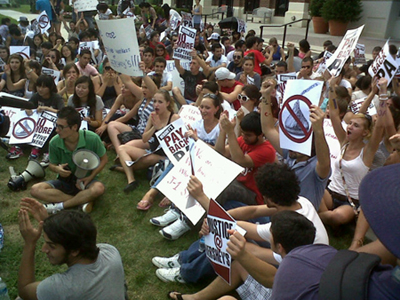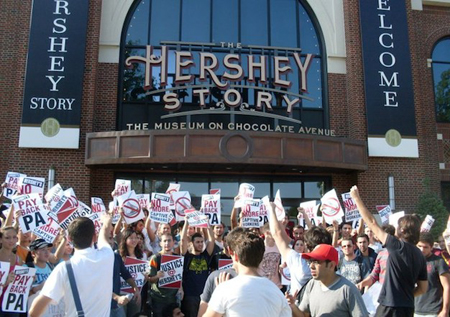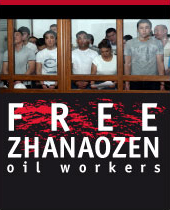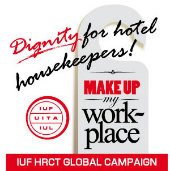 | WARNING: This is the OLD IUF website. Visit the NEW IUF website here: http://www.iuf.org |
Strike by student exchange workers at US chocolate maker Hershey exposes sordid trail of outsourcing and exploitation
Over 300 foreign student workers sat in and then walked off the job at a distribution plant in Palmyra, Pennsylvania on August 17, bringing into the spotlight a sordid trail of exploitation and abuse leading to premier US chocolate manufacturer Hershey.
The students, from countries as diverse as China, Moldova, Nigeria, Turkey and Ukraine, had come to the US on J-1 visas – a program ostensibly established to enable foreign students to learn about the US through a 2-month work and travel program. Thev had paid from 3-6,000 US dollars each for the privilege of working round-the-clock shifts lifting heavy packages on fast-moving lines packing Hershey-branded chocolates.
The workers were paid 8 dollars per hour to perform what were formerly union jobs. Extortionate rent for substandard, crowded housing and compulsory fees for company transportation to and from the plant, personal protective equipment, mandatory drug tests and even time cards were automatically deducted from their paychecks, leaving many workers with less than $100 for a forty-hour workweek.
 Discontent turned into action earlier this summer: the workers circulated a petition, signed by hundreds, protesting their conditions of employment. The employer responded with a captive meeting, explaining that protests could result in the loss of their visas and deportation. The workers, who had been in contact with the National Guestworker Alliance, and through them the AFL-CIO, walked out, convinced that they were being cheated - along with the US workers who should be performing what is clearly permanent work under decent conditions.
Discontent turned into action earlier this summer: the workers circulated a petition, signed by hundreds, protesting their conditions of employment. The employer responded with a captive meeting, explaining that protests could result in the loss of their visas and deportation. The workers, who had been in contact with the National Guestworker Alliance, and through them the AFL-CIO, walked out, convinced that they were being cheated - along with the US workers who should be performing what is clearly permanent work under decent conditions.
Who was the employer? Not Hershey! The formerly union jobs were triply outsourced, the end of the line (so far) in a process by which Hershey – whose revenue tripled in the first half of this year – has steadily eliminated union jobs through closures and transfers to low-wage producers both in- and outside North America, ending in the squalid trafficking of young foreign students under the guise of an educational exchange. Hershey has its alibi down pat – they don’t employ the Palmyra workers, AND they have a Supplier Code…
The disintegration of employer responsibility, carefully layered to drive down conditions and frustrate union organizing, is the end result of a meticulously implemented strategy.
In 2002, the Palmyra packaging facility, represented by the IUF-affiliated BCTGM, was closed - and reopened with a non-union workforce. The union launched an organizing effort to recapture the formerly union jobs. Hershey contracted operation of the warehousing and co-packing facility to Exel, a wholly-owned subsidiary of Deutsche Post/DHL.
To ensure that the site would remain non-union, Exel contracted SHS Staffing Solutions to provide it with “leased” employees . SHS, in turn, subcontracted recruitment to the Council for Educational Travel, USA (CETUSA)..
Some 350,000 young people came to the US last year on J-1 visas. Originally designed as a 2 month summer ‘work-travel’ program, it has become a vicious year round cycle for exploiting vulnerable, precarious workers. According to a recent New York Times article by Fordham University professor Jennifer Gordon, “Recent exposés by journalists and advocates have found similar abuse of J-1 visa holders at fast food restaurants, amusement parks and even strip clubs.” She goes on to write: “The J-1 program is attractive to employers because it is uncapped and virtually unregulated; companies avoid paying Medicare, Social Security and, in many states, unemployment taxes for workers hired through the program. One sponsor authorized by the State Department even offers a “payroll taxes savings calculator” on its Web site, so potential employers can see how much they would save by hiring J-1 visa holders rather than American workers. Visa holders can be deported if they so much as complain, and cannot easily switch employers.”
CETUSA supplies a continuous influx of young workers on a year round basis to SHS-Exel-Hershey at the Palmyra operation.

Hershey initially attempted to shake off responsibility by declaring it a supplier issue which didn’t directly concern them. Exel claims responsibility lies with SHS. SHS points the finger at CETUSA…
One week after the walkout, Hershey’s position had evolved to the point that, according to the New York Times, the company was offering the J-1 workers… “A day of educational events at the chocolate company’s headquarters in Hershey.”
According to a second article in the Times, “Kirk Saville, a Hershey spokesman, said the company had also asked the contractor that operates the vast plant in nearby Palmyra, Pa., to give the foreign students a fully paid week off, so that they could travel to see some sights in the United States.”
“We were disappointed to learn that some of the students were dissatisfied with the cultural exchange element of the program,” Mr. Saville said. “We want to ensure that all the students have a positive experience of this program and leave the United States with an understanding of the Hershey Company.”
More to the point, a local paper reported Hershey as telling “its subcontractors that operate the plant to make peace with the students, in part by offering them a …deal”, exploding the alibi that Hershey exercises no control over what happens at operations which produce and pack its branded products through multiple chains of subcontractors.
In 2009, a casual worker making "Hershey" chocolate at a New Jersey plant was crushed to death. Like the Palmyra workers, he didn’t work for Hershey either: "He was hired by the Heads Up Staffing Service to report to warehouse owner Lyons & Sons, which provided him to Cocoa Services, Incorporated, the processor doing business with Hershey.”
This is where the trail of union-busting outsourcing ends – in the destruction of union workplaces, in trafficking in migrants and in death on the job.
“Hershey has caused their exploitation and profited by it,” says BCTGM President Frank Hurt. “The students have been used by the Hershey Company and the Hershey Trust to avoid having to employ full-time, unionized workers."
The IUF has written Hershey executives in support of the J-1 workers’ insistence that the the fees and deductions from their wages – taken in violation of national and international law - must be fully returned. The workers are also demanding that the BCTGM, whose members’ jobs were stolen, must be recognized in the Palmyra facility, and positions staffed by laid-off Hershey workers – past, present and future – and the local unemployed.
You can support the fight for jobs and justice at Palmyra - click here to send a message to Hershey.







